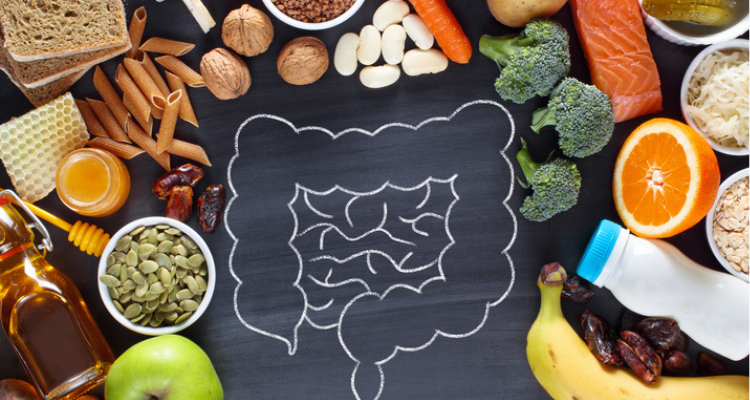
Recently, the term microbiome has appeared in a range of health and wellness contexts. The microbiome is a relatively new idea that recognizes us as more than just human beings—our bodies are an entire environment. The integrative medical community and traditional practices have discussed this idea for quite some time, and now we have the research to back it up.
Think of the human body as a garden. A wide variety and diverse balance of plant species are crucial to its survival and ability to thrive. Many strains of probiotic bacteria in the gut contribute to healthy metabolic function, appetite control, immune health, mood, and more. These are all factors that play a role in reaching and maintaining a healthy weight.
A balanced microbiome and a diet that supports gut health directly impact weight management via neurotransmitters manufactured in the gut. Indirect impacts occur via immune health, energy production, and nutrient absorption.
Furthermore, when we look at the converse, we see a solid link between antibiotics and excessive weight. This translates to the conclusion that an unbalanced microbiome may lead to weight gain or losing weight when good bacteria are destroyed.[1]
gut bacteria and weight management: how does it work?
While we are beginning to understand the intricate connections between weight management and the gut microbiome, there is much left to discover.
There is no such thing as fat or thin gut bacteria. However, the gut microbiome composition, diversity of bacterial strains, and population of beneficial bacteria seem to contribute to a healthy weight.
Some research also shows correlative associations between specific probiotic strains (such as christensenella and akkermansia), but this might not work in the way most people would like. While these strains seem to sometimes be associated with metabolic health and normal weight, simply supplementing with these probiotic strains as a weight loss strategy doesn’t tend to work. Instead, eating a varied and healthy diet of whole foods that naturally exposes you to many strains of probiotic bacteria might organically increase these types of weight-benefitting bacteria.[2]
Fascinating research is being done on microbiome type, similar to blood type. This research hypothesizes that certain people are naturally hospitable for specific bacterial strains and species due to genetics. This could explain why microbiome testing isn’t always helpful, as our genetic microbiome composition might give us a greater propensity for the proliferation of certain species. Until this research expands further, many practitioners recommend a broad-based probiotic supplement and diverse intake of probiotic foods. Think of this as tossing seeds in your garden or inundating the upper and lower gut with beneficial bacteria.

Neurotransmitters are produced directly in the gut. We now know that stress and mood impact digestion from the top down, and the same neurotransmitters that are thrown off in people who experience anxiousness and mood issues are the same messengers that are used in the gut. A healthy gut microbiome can help correct these imbalances, which can negatively affect many metabolic processes linked to body weight and composition.[3]
how a damaged gut impacts weight management
A damaged gut lining can impact weight management in several ways, such as impaired nutrient absorption and increased food intolerances. It’s essential to look downstream when addressing gut problems, as taking a probiotic supplement won’t help if underlying issues are present.
First and foremost, digestion must be working correctly in the breakdown and absorption of foods. This includes sufficient chewing, adequate hydrochloric acid (HCl) in the stomach, and plenty of pancreatic enzymes to prep food in the upper digestive tract for optimal absorption. When these functions are off, damage to the low intestines can ensue, leading to what many in the integrative world refer to as leaky gut or gut permeability.
Essentially, this term refers to a heightened inflammatory process in the lower gut, as compared to any other inflammatory process in the body. Swelling occurs, and the immune system is activated. The body is hesitant to release excess weight (stored for future emergencies) when it finds itself in a state of stress or immune activation.[4]
common gut offenders and their link to weight gain
Common gut offenders that can potentially contribute to trouble managing weight include antibiotics, antibacterial soaps and cleaners, ongoing high levels of stress, refined sugar, and processed foods. A diet high in sugar from any source (including fruit) is also correlated with poorer immune function, activation of inflammatory pathways, and less abundance of healthy gut bacteria.[5]
While antibiotics can be necessary and lifesaving, studies have linked repeated use in young children and overuse throughout childhood and adulthood to poor gut health.[6] A recent study also found that triclosan—a common antibacterial agent used in soaps—can disrupt metabolic function and the gut microbiome by stripping away liver cells’ natural protection.[7]
There is also a fascinating link between probiotics and immune function.
microbiome diet for weight management
Along with addressing underlying digestive problems, getting physical activity, managing stress, and considering a broad-spectrum probiotic supplement, diet plays a significant role in the health of your gut microbiome and weight management.
For optimal gut bacterial balance, eat the following:
real foods
Regardless of whether you opt for a vegan, vegetarian, paleo, or keto diet, all experts agree that eating real foods from nature while limiting overly processed foods is vital. This ensures you are getting fiber, vitamins, minerals, phytonutrients, and other essential components that come from whole foods.
wide variety of vegetables
Try to vary your vegetable intake and include plenty of brightly colored plants in your diet. Consider trying something new every week.
probiotic and prebiotic foods
Fermented foods like raw sauerkraut, kimchi, kefir, yogurt, kombucha tea, and miso are an excellent source of probiotics. Switch up the probiotic foods you eat, as well as the brands. Prebiotics include dandelion greens, Jerusalem artichoke, onions, garlic, leeks, and asparagus.
takeaway
The fascinating study of the gut microbiome’s role in weight management is relatively new, and there is still a lot we don’t know. We do know that a balanced and healthy microbiome plays a role in reaching and maintaining a healthy weight, along with proper digestive function in the upper gastrointestinal tract. Support a flourishing gut microbiome with whole foods and a wide variety of plants, probiotic and prebiotic foods, and a broad spectrum probiotic supplement.*

[1] Srivastava, A., Chau, K., Kwon, H., Guo, Q., & Johnston, B. C. (2020). Early and frequent exposure to antibiotics in children and the risk of obesity: systematic review and meta-analysis of observational studies. F1000Research, 9, 711. https://doi.org/10.12688/f1000research.24553.1
[2] Zhou K. (2017). Strategies to promote abundance of Akkermansia muciniphila, an emerging probiotics in the gut, evidence from dietary intervention studies. Journal of functional foods, 33, 194–201. https://doi.org/10.1016/j.jff.2017.03.045
[3] Strandwitz P. (2018). Neurotransmitter modulation by the gut microbiota. Brain research, 1693(Pt B), 128–133. https://doi.org/10.1016/j.brainres.2018.03.015
[4] Karl, J. P., Hatch, A. M., Arcidiacono, S. M., Pearce, S. C., Pantoja-Feliciano, I. G., Doherty, L. A., & Soares, J. W. (2018). Effects of Psychological, Environmental and Physical Stressors on the Gut Microbiota. Frontiers in microbiology, 9, 2013. https://doi.org/10.3389/fmicb.2018.02013
[5] Satokari R. (2020). High Intake of Sugar and the Balance between Pro- and Anti-Inflammatory Gut Bacteria. Nutrients, 12(5), 1348. https://doi.org/10.3390/nu12051348
[6] Del Fiol, F. S., Balcão, V. M., Barberato-Fillho, S., Lopes, L. C., & Bergamaschi, C. C. (2018). Obesity: A New Adverse Effect of Antibiotics?. Frontiers in pharmacology, 9, 1408. https://doi.org/10.3389/fphar.2018.01408
[7] https://www.sciencedaily.com/releases/2020/11/201124101035.htm

















